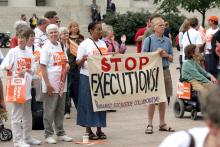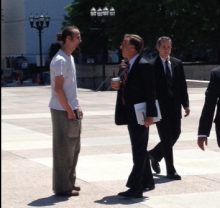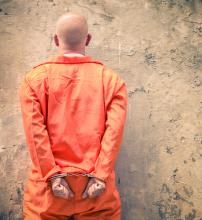Death Penalty

On Nov. 6, Wheaton, “the Harvard of Christian colleges,” is hosting a forum on the death penalty. But it’s not just any forum. It has potential to reshape the way evangelicals in America think about the topic.
In addition to Wheaton’s own ethicist Vincent Bacote and Mercer University scholar David Gushee, the panelists include Kirk Bloodsworth, who spent eight years on death row for a crime he didn’t commit. Also on the panel is Frank Thompson, former superintendent of the Oregon State Penitentiary who witnessed executions. And finally, there is Gabriel Salguero, who heads up the National Latino Evangelical Coalition and is also a member of the National Association of Evangelicals, a Christian powerhouse representing 45,000 congregations from over 40 denominations.
This is big.
I’ll admit, part of me wished this monumental death penalty event was happening at my alma mater, Eastern University. After all, Eastern is well-known for its social justice edge, its progressive faculty — folks like Tony Campolo and Ron Sider. One Eastern alum, death penalty lawyer Bryan Stevenson, was recently called “America’s young Nelson Mandela” by Desmond Tutu and interviewed in Time magazine and The New York Times.
After I pouted a little while, I realized the significance of this forum.

Pope Francis said Oct. 23 that keeping inmates isolated in maximum security prisons is “a form of torture,” and called life sentences “a hidden death penalty” that should be abolished along with capital punishment.
“All Christians and people of good will are called today to struggle not only for abolition of the death penalty, whether legal or illegal, and in all its forms, but also to improve prison conditions, out of respect for the human dignity of persons deprived of their liberty,” the pope told delegates from the International Association of Penal Law.
“And this I connect with life imprisonment,” he continued. “Life imprisonment is a hidden death penalty.”
The pope noted that the Vatican recently eliminated life imprisonment from its own penal code, though that move was largely symbolic.
In the wide-ranging address, Francis denounced practices that are widespread in many regions of the world, such as extrajudicial executions and detentions without trial, which he said account for more than half of all detentions in some countries.
Francis also denounced corruption in penal systems, calling it “an evil greater than sin.”

“We cannot endure even to see a man put to death, though justly…We, deeming that to see a man put to death is as much the same as killing him” (Athenagoras of Athens, a Christian philosopher writing a defense of Christianity, speaking against state-sponsored killings and abortions, around 177 A.D.)
I am not sure where it originated, but somewhere someone started a rumor that if you are against the death penalty then you are soft on crime and care more about the guilty than the victim. Nothing could be farther from the truth!
Through marriage, a close relative of mine was murdered. I officiated the funeral. I attempted to comfort my family. I know the pain and evil of murder. I also know the pain and evil of a justice system that freed the killer after a few short years behind bars.
As a minister, and more importantly as a follower of Jesus, I take his words about visiting prisoners seriously (Matthew 25:36). I believe in forgiveness and grace and mercy. I believe in the Great Commandment (Matthew 22:34-40). I also realize you don’t get placed on death row for being a boy scout. People do need to pay for their crimes. The more serious the crime, the more serious the penalty. But ultimately, as a follower of Jesus, I believe in reconciliation. I believe in redemption. I believe no one is outside the realm of God’s mercy and grace.

“Capital punishment is against the best judgment of modern criminology and, above all, against the highest expression of love in the nature of God” (Dr. Martin Luther King Jr.)
I despise labels, but I guess you can’t get away from them. For example, I am called an American (a label). I would prefer to be called a United States Citizen because the term “American” is ethnocentristic. The term should mean I am part of the American continents, but it is never used that way. “American” is almost always used to refer to a person who lives in the United States. However, Canadians and Mexicans are also Americans; and so are Hondurans and Brazilians.
I wish I could simply be called “Christian.” But that label necessitates the need for additional labels. Am I Protestant or Catholic? Am I orthodox or neo-orthodox? Am I a fundamentalist, an evangelical, or main-line? Am I emergent, traditional, liberal, progressive, or contemporary? To which denomination do I belong, or am I non-denominational? Maybe I am inter-denominational? Am I charismatic or cessastionist?
It’s maddening!
My preference would be to be called a follower of Jesus. But what does that mean?
Then there are political labels … and they are the worst!
Am I conservative or liberal? Am I a Republican or Democrat or Independent or Libertarian or something else? Am I pro-life or pro-choice? Am I a patriot or and antagonizer? Am I a capitalist, socialist, or communist? Where do I stand on gun rights? What about human rights, or same-sex marriage, or LBGT issues, or immigration, or Obamacare, etc., etc., etc … blah, blah, blah …
Why can’t I just be me?
It’s a lost cause. No matter how hard I try not to be boxed in, people label me. So, let me give you my best shot at who I am based on labels. (Of course, if your definition of the labels is not the same as my definition, then we will have a hard time communicating.) Here goes:
A U.S. District Court judge declared the death penalty "unconstitutionall" in the State of California.
In the ruling that was released today, U.S. District Court Judge Cormac Carney wrote that, an "inordinate and unpredictable delay has resulted in a death penalty system in which very few of the hundreds of individuals sentenced to death have been, or even will be, executed by the State."
NBC Bay Area first reported the ruling:
In his 29-page ruling on the Jones vs. Chappell case, Carney wrote that when an individual is condemned to death in California, the sentence carries with it the promise that it will actually be carried out.
That promise is made to citizens, jurors, victims and their loved ones and to the hundreds of individuals on death row, he wrote.
However, Carney argues, “for too long now, the promise has been an empty one.”
Read the full story here.

Ralph Reed’s recent Road to Majority conservative confab in the nation’s capital had an unlikely exhibitor in the conference hall: opponents of the death penalty.
The activists were in the right place because their opposition stems from conservative principles. Conservatives Concerned About the Death Penalty believe that the faithful who gathered at the annual event hosted by Reed’s Faith and Freedom Coalition are ripe for embracing their critical view of capital punishment.
They have their work cut out for them. Yes, support for death penalties has been dropping in a Pew survey — from 78 percent in 1996 to 55 percent last year. But this barbaric practice still enjoys strong preference among conservatives, with 69 percent expressing support in a June ABC News/Washington Post poll. Only 49 percent of liberals agreed. Among Republicans, support is even higher — at 81 percent.
So what kind of reception did the activists receive? The group’s advocacy coordinator, Marc Hyden, told me the response was very positive.

After an unusual six-week lapse in executions in the nation since a botched effort in Oklahoma on April 29, two men could face lethal-injection deaths in Georgia and Missouri Tuesday night or early Wednesday.
Wellons, 59, was sentenced to death for the 1989 rape and murder of 15-year-old India Roberts, whom he abducted as she was on her way to a school bus.
At 12:01 a.m. Wednesday, Missouri is preparing to execute John Winfield, who blinded the mother of his two children and killed two other women in a 1996 shooting spree. A judge on Thursday issued a stay of execution, but prosecutors are seeking to have it lifted in time for Winfield’s execution to proceed.
A third inmate, in Florida, is slated to be put to death Wednesday evening.

It’s 93 degrees in Texas today. And Rev. Jeff Hood is walking 200 miles across the state. What would compel somebody to do that? He wants to end the death penalty … and he is not alone.
Rev. Jeff Hood is a Southern Baptist pastor, deeply troubled by his denomination’s stance on capital punishment. And he is troubled because he lives in the most lethal state in the U.S. Texas has had 515 executions since the reinstatement of the death penalty in 1976 – the next state in line is Oklahoma with 111. That means Texas is responsible for 37 percent of the executions in the U.S. Jeff has been a longtime organizer and board member for the Texas Coalition to Abolish the Death Penalty, a movement that is gaining some serious momentum these days.
A growing number of Texans — and Americans in general — are questioning the death penalty. A recent ABC poll shows we are over the tipping point, with more than half of Americans being against the death penalty and in favor of life in prison, putting death penalty support at a new low. For some it is the racial bias – in Texas it is not uncommon for an African American to be found guilty by an all-white jury. In fact, in considering “future dangerousness,” a criteria necessary for execution in Texas, state “experts” have argued that race is a contributing factor, essentially that someone is more likely to be violent because they are black – prompting articles like the headline story in the New York Times about Duane Buck: “Condemned to Die Because He is Black.”

Southern Baptist leader Albert Mohler wrote a piece last week defending the death penalty. In his 1,200-word argument for why Christians should support the death penalty, he does not mention Jesus a single time.
Digging deeper, as you read the official pro-death penalty statement of the Southern Baptists, there is not a single reference to Jesus or the Gospels.
There are plenty of other problems with the scriptural maneuvering used to justify the contemporary practice of the death penalty with a few verses from the Bible, in the same way that a few verses were misused to justify slavery. For starters the biblical death penalty was required not just for murderers, but also for folks that committed adultery, disrespected their parents, collected too much interest, had premarital sex, and disobeyed the Sabbath. But I want to stick with the nagging problem of Jesus, the greatest obstacle for pro-death penalty Christians.
In a recent Barna Poll, fewer than 5 percent of Americans think Jesus would support capital punishment, and fewer than a quarter of young Christians support it. Nonetheless some Christians find ways to sidestep Jesus, the lens through which all of us who claim to be Christians should interpret the Bible and the world around us.

After this week’s botched execution in Oklahoma, Albert Mohler, president of The Southern Baptist Theological Seminary, argued why Christians should support the death penalty at CNN.com. Grounding his argument in Genesis 9:6, where Noah is told that anyone guilty of intentional murder should be put to death, Mohler says, “The one who intentionally takes life by murder forfeits the right to his own life.”
In my experience, most Christian pro-death penalty advocates make similar arguments, rooting themselves in Old Testament teaching. On occasion, they bolster their thinking with a somewhat cryptic reference to the government’s ability to “bear the sword” to “bring punishment on the wrongdoer” by the Apostle Paul. Rarely, will anyone cite Jesus’ teachings.
Mohler is a capable theologian and a thinker I respect. And I have many intelligent friends who support the death penalty. Yet, I think it is problematic for Christians to root their support of capital punishment in the Jewish Scriptures.

In 2009, I accompanied my friend Steve Henley on his journey to execution in Tennessee. As his spiritual advisor, I was able to be with him for a few hours before he was removed from his deathwatch cell and strapped to a gurney. I was there with his family as the blinds were raised and as he tried to make them smile. I was there when he spoke his last words, when the poison entered his veins, when he began to turn blue, and when he finally was declared dead. This image of my friend, who I visited for 10 of his 23 years on death row, will stay with me forever. Steve’s execution lasted about 12 minutes.
Clayton Lockett’s execution lasted 43 minutes. All of those present at his execution — correctional staff, attorneys, media, the victim’s family, clergy, and others — will now live with the image of what happened in Oklahoma on Tuesday. The horror they witnessed will be with them forever, regardless of their opinion of Clayton Lockett. Though Oklahoma officials had all sorts of reasons to suspect that there might be problems with this execution — using an untested mixture of lethal injection drugs whose source was kept secret — they proceeded for the sake of expediency, leading to the inevitable cruelty that followed.
By all accounts, Clayton Lockett did a terrible thing. He shot and killed 19-year-old Stephanie Nieman in 1999, taking away her life and all its possibilities. Some might even say that Clayton Lockett got what he deserved for his crime. But was what the state of Oklahoma did on Monday really about Clayton Lockett?

The botched execution of Clayton Lockett in Oklahoma on Tuesday has refocused the nation on the inherent contradictions in the death penalty. But here in Wisconsin last week, an opera helped focus the attention of one community on the many human issues woven into the debate over crime and punishment.
In real life at the Oklahoma State Penitentiary in McAlester, a mix of lethal drugs injected into the body of Lockett caused seizures rather than immediate death. On stage in the opera version of Dead Man Walking, the drug machine clicks, hums, and whirrs with efficiency, leaving the fictional character Joe DerRocher dead on the stage.
Dead Man Walking — the book by Sr. Helen Prejean about her work with prisoners on death row and the families of their victims — became an award-winning movie in the mid-1990s starring Susan Sarandon and Sean Penn. It was recreated as an opera in 2000 and since then has played in 40 cities.
What happened in Madison, Wis., last week was more than the presentation of an opera. It was the culmination of six weeks of some 20 events engaging about 1,500 community members in discussion of many facets of the criminal justice system. The two performances of the opera itself drew about 3,000 people. It was a classic example of art engaging life.
Capital punishment itself is not so much of an issue in Wisconsin – the state has banned it since 1853. But Wisconsin does have the highest rate of black male incarceration in the nation. Its prison system tilts far more toward punishment than toward treatment and rehabilitation. It imprisons twice as many people as its neighboring and demographically similar state of Minnesota.

At 6:23 p.m. yesterday, the state of Oklahoma initiated its effort to kill Clayton D. Lockett. Twenty minutes later, after being declared unconscious by a physician, Lockett cried out, "Oh, man," writhing in pain. Addled by this unexpected display of pain, one of the executioners said, "Something’s wrong." Soon after, the window to the observation room was covered and media were escorted out of the room.
A state official later reported that Mr. Lockett died of a heart attack at 7:06pm.
The fact that this unexpected scene was preceded by months of arguments by lawyers about the constitutionality of resuming executions in Oklahoma guarantees that a debate about the death penalty will ensue. Those who have argued that this ultimate form of punishment is "cruel and unusual" will make last nights scene their case in point. The Governor of Oklahoma has already declared that a thorough investigation of what went wrong will take place before any other executions go forward. Privately, in conversations at home and on their computers, many will say, "Did he suffer? Sure. But why shouldn’t he after what he did." Most national polls show that support for vs. opposition to the death penalty is about 50/50. Both sides will have plenty of people to argue.
But I think it would be the greatest of tragedies if we did not notice that what happened in Oklahoma last night reveals perhaps our deepest national self-deception — that, no matter what goes wrong, we will fix it because we are in control.

Society has an affinity for death. There is a pervasive fascination with (im)mortality. We appreciate life, but we are seduced at the intricacies and unknowns of death. While there is much enjoyment and celebration over health, personal accomplishments, births, and birthdays, women and men around the world ponder the “what ifs” concerning the end of life. The thought of death grips us with a “thanatopsis” like inquisitiveness — no fear just sheer curiosity.
Look at the ubiquitous commentary on demise and dying. The Walking Dead has become one of the most highly watched shows. Along with True Blood, Cold Case, and Resurrection television is replete with musings over death and what happens when the “dead” come back to life. Don Piper’s 90 Minutes in Heaven and the book-turned-film Heaven is for Real challenge us to discard any sense of reason or rationale when it comes to what many of us living have not experienced personally — that is dying. Yes, we have gone to funerals, but dare I say we were not in the casket.

Last week, the men on Tennessee’s death row, four of whom have scheduled execution dates in the near future, invited Gov. Bill Haslam, the man who signs the death warrants, to join them for prayer
The backdrop for the story is that Tennessee has more executions scheduled in a year than the state has had in the past 50 years. Last week as Christians around the world remembered Good Friday, the day Jesus was executed, legislators in the Bible Belt state passed a bill to reinstate the electric chair (which would make it the only state to require death by electrocution). The only thing that could be more troubling would be if Tennessee decided to start crucifying people again. I even heard one politician defend his position saying, “It is God’s job to judge them, but our job to get them to Him.”

Twelve years ago we took our beloved Maltese dog, Moose, to the vet and came home without him. Moose was in the late stages of congestive heart failure, and many times each day he was wheezing and crying out in pain. While my daughter held the little dog, the vet gave him a shot. It was over very quickly.
Why don't we treat death row prisoners at least as well as we treat dogs?
"Secret Drugs, Agonizing Deaths" is the headline on an article in yesterday's New York Times. Back when executioners wielded axes, they tended to wear hoods so people wouldn't recognize them. Nowadays states still conceal executioners' identities — and much more.

I WORK ON the frontlines of the movement to end the death penalty in the United States. I grew up in a conservative evangelical home and my faith has led me to this work. In 2008, I had the opportunity to hear stories from murder victims’ family members, death row exonorees, and corrections officials who participated in executions—all of whom believe the death penalty should be abolished. At that point I felt called to do this work and to begin engaging with other evangelicals.
I will confess, it was a lonely job when I started. I wondered who else would join me. So you can imagine my excitement at seeing what has today become a nationwide chorus of Christian voices questioning capital punishment.
A recent poll by the Barna Group showed a majority of Christians in the United States now oppose capital punishment and that young Christians oppose it by a large majority. More than two dozen evangelical leaders from around the country and across the political spectrum recently made their voices heard by publicly requesting a new sentencing hearing, free of racial bias, for a Texas death row inmate. Even conservative political leaders are speaking out against the death penalty.
As one who has been in the trenches on this issue for years, I can confirm that Christian engagement is helping to transform the death penalty debate, and I can tell you that it is being driven by the same forces that moved me—faith and cold, hard facts.

Prison guards meet in the desert to hand off chemicals for executions. A corrections boss loaded with cash travels to a pharmacy in another state to buy lethal sedatives. States across the country refuse to identify the drugs they use to put the condemned to death.
This is the curious state of capital punishment in America today.
At the same time, growing numbers of states are ending capital punishment altogether. Others are delaying executions until they have a better understanding of what chemicals work best. And the media report blow-by-blow details of prisoners gasping, snorting, or crying out during improvised lethal injection, taking seemingly forever to die.
Legal challenges across this new capital punishment landscape are flooding courts, further complicating efforts by states that want to keep putting people to death.

Mohammad Asghar, a 69-year-old paranoid schizophrenic, faces a death sentence in Pakistan for claiming to be the Prophet Muhammad in letters written to officials and police in 2010.
The retired British national of Pakistani descent is partially paralyzed after a stroke, but Pakistani courts have so far refused to acknowledge his physical and mental limitations.
The charges against Asghar recall the case of Rimsha Masih, a teenage girl who was alleged to have dumped torn and burnt pages of the Quran into a garbage heap nearly two years ago.

As I stated yesterday, I believe that America’s justice system is broken and in need of desperate repair. One of those areas is the practice of putting our citizens to death, something I believe that all Jesus People should resoundingly oppose.
When I was a conservative evangelical, I was a huge supporter of capital punishment for all of the standard reasons. I even had a quick response when folks correctly brought up the hypocrisy of being against abortion while simultaneously being pro-death penalty, a position I previously argued you can’t hold and still call yourself “pro-life.”
However, when I decided to follow Jesus instead of simply being a Christian who paid him hollow worship while conveniently ignoring the red words, I was forced to abandon my support of the death penalty (and abandon my support of violence in general) as part of Following Jesus 101.
While America’s broken justice system is a complex issue, perhaps the first area we can fix is by abolishing the death penalty in all 50 states. Here’s why I think Jesus People should be leading the charge on this issue: